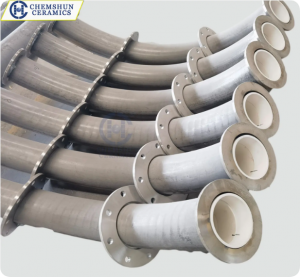Metal pipes and ceramic lined steel pipes are two common pipes in industrial production today. In addition to bearing the heavy burden of material transportation, they also have to shoulder many responsibilities such as wear resistance, corrosion resistance, and safety assurance. So when ceramic pipes meet metal pipes, which one will you choose?
1. Wear resistance
First of all, from the perspective of wear resistance, the most important factor affecting wear resistance is the hardness of the material, and both metal and wear-resistant ceramics can improve hardness by changing the formula and improving the process. However, the hardness and weldability of metal pipes conflict and restrict each other. The weldability will decrease significantly when the hardness is improved. If both are taken into account, the cost will rise sharply. In comparison, the hardness of ceramic pipes can reach HRA90 within the normal price range, with very strong wear resistance and high cost performance.
2. Corrosion resistance
Corrosion resistance mainly refers to acid and alkali corrosion. Metal materials have active chemical properties and are easily reacted with acids and alkalis, thereby being corroded. Wear-resistant ceramics are calcined at 1700℃ to convert alumina into α-alumina with very stable performance, and have excellent resistance to acid and alkali corrosion.
3. Safety performance
The so-called safety performance refers to the stability of the pipeline during use, that is, whether there will be problems such as hanging material, blocking material or material leakage during material transportation. This mainly depends on the smoothness of the pipeline and the firmness of the connection. The initial smoothness of metal pipes and ceramic pipes is relatively high, but the smoothness of metal pipes will decrease after wear, while Chemshun’s wear-resistant ceramic pipes will become smoother as they are worn because of the addition of self-lubricating ingredients. In terms of connection, metal pipes have greater advantages, but Chemshun’s newly developed ultra-long one-piece wear-resistant ceramic pipes can reach a length of 3 meters, which greatly reduces the connection points and effectively compensates for this problem.
From these three points of view, in ordinary industrial applications, the performance of wear-resistant ceramic pipes has obvious advantages under the same cost performance, and in the emerging industry of lithium batteries, ceramic pipes can also isolate metal pollution, which is highly recognized by the market.
Post time: Apr-22-2025


